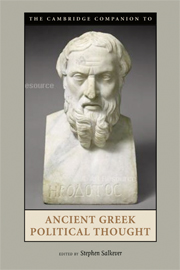Book contents
- Frontmatter
- Introduction
- 1 Homer and Political Thought
- 2 Foundings vs. Constitutions: Ancient Tragedy and the Origins of Political Community
- 3 Most Favored Status in Herodotus and Thucydides: Recasting the Athenian Tyrannicides through Solon and Pericles
- 4 Thucydides and Political Thought
- 5 “This Way of Life, This Contest”: Rethinking Socratic Citizenship
- 6 The Political Drama of Plato’s Republic
- 7 Practical Plato
- 8 Reading Aristotle’s Nicomachean Ethics and Politics as a Single Course of Lectures: Rhetoric, Politics, and Philosophy
- 9 Lived Excellence in Aristotle’s Constitution of Athens: Why the Encomium of Theramenes Matters
- 10 The Virtue Politics of Democratic Athens
- 11 Origins of Rights in Ancient Political Thought
- 12 The Emergence of Natural Law and the Cosmopolis
- Select Bibliography
- Index
4 - Thucydides and Political Thought
Published online by Cambridge University Press: 28 September 2009
- Frontmatter
- Introduction
- 1 Homer and Political Thought
- 2 Foundings vs. Constitutions: Ancient Tragedy and the Origins of Political Community
- 3 Most Favored Status in Herodotus and Thucydides: Recasting the Athenian Tyrannicides through Solon and Pericles
- 4 Thucydides and Political Thought
- 5 “This Way of Life, This Contest”: Rethinking Socratic Citizenship
- 6 The Political Drama of Plato’s Republic
- 7 Practical Plato
- 8 Reading Aristotle’s Nicomachean Ethics and Politics as a Single Course of Lectures: Rhetoric, Politics, and Philosophy
- 9 Lived Excellence in Aristotle’s Constitution of Athens: Why the Encomium of Theramenes Matters
- 10 The Virtue Politics of Democratic Athens
- 11 Origins of Rights in Ancient Political Thought
- 12 The Emergence of Natural Law and the Cosmopolis
- Select Bibliography
- Index
Summary
While the works of Plato and Aristotle draw universal attention from students of political philosophy, Thucydides' reception has been more limited and localized. Most frequently, he is sought for his contributions to international relations theory, often accessed through a small number of set pieces such as the Melian dialogue. Whatever the reasons for this relative lack of attention, it is unfortunate, for Thucydides is an important conversation partner not only with more familiar voices within the so-called Western tradition of political philosophy but also with modern political theorists who discuss the functions and disorders of political institutions and political cultures. In this connection, Thucydides may have more to contribute to democratic political theory than is often supposed. Appreciating his contributions means taking him at his word when he writes early in Book 1 of the History that he has composed “a possession forever, and not a competitive entry to be heard for the moment” (1.22). Yet the precise meaning of this very ambitious claim is unclear. Interpreting it is inseparable from coming to grips with the kind of work this is.
Assessments of the genre of Thucydides' work proliferate. He has been read as a historian who narrates and explains the most striking events of his time, as a social theorist who discovers the deepest causes of political disorder, and as a memorializer of the civic leadership of Pericles. To the extent that we are convinced by one or more of these judgments, however, Thucydides’ voice is heard as conclusive and monologic and the political thought that emerges from the pages of his work stands apart from the immediate context of political life.
- Type
- Chapter
- Information
- The Cambridge Companion to Ancient Greek Political Thought , pp. 96 - 125Publisher: Cambridge University PressPrint publication year: 2009
- 1
- Cited by



